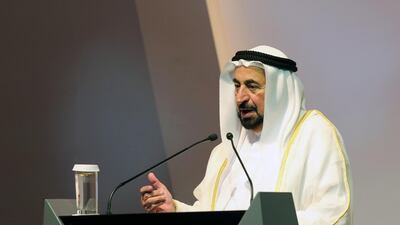The Ruler of Sharjah called on the "protectors and guards" of Arabic to dedicate themselves to ensuring that the language remains relevant.
Sheikh Dr Sultan bin Muhammad Al Qasimi said the Arab world was "pinning its hopes" on researchers and language specialists to help preserve the native tongue of millions of people across the Middle East.
Sheikh Dr Sultan's message was delivered by Dr Issa Saleh Al Hammadi, director of the Educational Centre for the Arabic Language of the Gulf States in Sharjah, during the Arabic Language Conference held in the Mauritanian capital of Nouakchott.
"The prestige of the Arabic language requires us and all who care to look at its contemporary issues and to examine its affairs and conditions," said Sheikh Dr Sultan.
"We pin our hopes on you, as Arabs, protectors and guards of the Arabic Language, to study its affairs and put [in place] practical programmes and projects for the generations that may facilitate [the] use, employment and speaking of the language."
The Sharjah Ruler said Arabic had deep roots in Africa and had thrived in the face of adversity.
"In spite of the difficult circumstances experienced by many African countries in the last two centuries due to western colonialism, which tried hard to undermine the pillars of the Arabic language and ignore and disregard it, this unique language has remained standing, and continued to live and survive, instead of disappearing and vanishing, because the means of its preservation are inherent in it, where all the elements of survival, life, development and continuity exist."
Sheikh Dr Sultan said concerted efforts were being made to promote the language.
"Our interest in the historical dictionary of the Arabic language is still the pivot of our projects under the supervision of language academies," Sheikh Dr Sultan said.
"We have established poetry houses in several Arab capitals and cities. We spare no effort to always serve this great language, which God has honoured us with as the language of the Holy Quran."
The conference, which ended on Saturday, was attended by representatives of Arabic language academies in the Middle East and Africa.
Sheikh Dr Sultan's call comes as efforts continue in the UAE to ensure the language remains at the heart of education in the country.
In July, Hussain Al Hammadi, the Minister of Education, urged pupils and parents to share their views on how teaching of Arabic could be made more dynamic.
"This objective is not limited to a specific school, it involves all public and private schools," Mr Al Hammadi said.
“We look forward to the contribution of the community in this development, and we would like to know the public’s opinion on education levels in all schools without exceptions.”
A study was launched last year to assess whether Arabic was being taught effectively in schools.
In January, it was revealed that private schools across the country would launch a new Arabic digital teaching programme, bilArabi, this month.
The programme, which will rely on mobile apps, seeks to revive interest in learning the language.
Noura Al Kaabi, the Minister of Culture and Knowledge Development, said the government was making progress in promoting Arabic.
"The UAE will work hard to promote the status of the Arabic language among other living languages of the world," she said.

